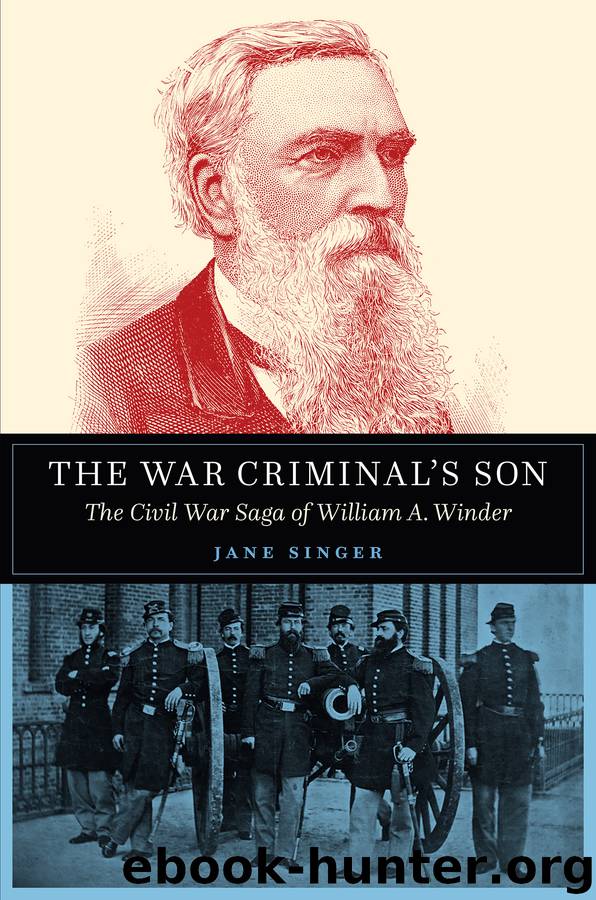The War Criminal's Son by Jane Singer

Author:Jane Singer
Language: eng
Format: epub
Tags: HIS036050 History / United States / Civil War Period (1850-1877)
Publisher: Potomac Books
12
Heal Thyself
If one could blink through a stereoscope at an image of William A. Winder in the late 1860s, there would be no soldier there. Long gone is his captain’s uniform. Gone were the epaulets, stored away in a tin box. He is a full-bearded gentleman in gentlemen’s dress—a velvet-collared frock coat, a gleaming white shirt, a thin black tie. Blink again, and if he blurs, wait. You might see him in Old Town. Do not think the place is any less raucous than it was before the war. Picture it in daylight, a swirl of skirts with dirt spattering ladies’ hems, for it is usually muddy or dusty in Old Town. Perhaps William A. boards for a night or a longer stay at the American Hotel, “on the South side of the Plaza,” where there is a “bar stocked with the choicest wines liquors and cigars . . . a fine billiard table, where the Knights of the Cue can be accommodated at all hours of the day.”1
There are still dog fights, bloody tethered bears torn by mastiffs, bulls gored for show, gunshots by night, and drunks, among them Judge Oliver S. Witherby. Ephraim Morse, a diligent diarist, witnessed the half-dressed judge stumbling along the plaza, past the courthouse, and then carried home semi-conscious, to preside the next day over the sentencing of a man whose name he’d likely forgotten.
“I never saw a man suffer from drink more after a spree than Judge Witherby,” Morse had once written about the judge, “yet he starts in to get drunk just as deliberately and makes his preparations as quietly as though he was going on a journey. He had at one time a contract with Dr. Hoffman to attend him after his sprees for a certain sum each time, which he paid with perfect satisfaction.”2
Despite his disapproval of such behaviors, the uncommonly fair Morse rarely had an unkind word to say about any of his neighbors, reserving his occasional vitriol for the bigoted southerners, the so-called Copperheads who had caused his wife, Mary, to be driven from her post as a schoolteacher. Even William A., who has so disappointed him, does not come under withering personal fire. They are old friends. This is Old Town, where forgiveness is not an illusion.
On one of his trips to Los Angeles from Old Town—to close out his land business and be done with it—an observer could have followed William A. along the plaza and heard Alfred Seeley inducing travelers to take his stagecoaches to Los Angeles. Like a town crier he proclaimed, “Old Town is the town, the real San Diego!” One could walk a few steps to the point of departure for his “San Diego–Los Angeles line.” Mind the mules and the mud, the drunks and the stray dogs, and step into the ticket office at the jewel of the plaza, Seeley’s Cosmopolitan Hotel.3
Before Seeley purchased the building, it had been a crumbling adobe structure that was “once the finest residence in Old Town and host to all the famed personalities” who had been guests of the owner, Juan Bandini.
Download
This site does not store any files on its server. We only index and link to content provided by other sites. Please contact the content providers to delete copyright contents if any and email us, we'll remove relevant links or contents immediately.
| Afghan & Iraq Wars | American Civil War |
| American Revolution | Vietnam War |
| World War I | World War II |
Waking Up in Heaven: A True Story of Brokenness, Heaven, and Life Again by McVea Crystal & Tresniowski Alex(37031)
Empire of the Sikhs by Patwant Singh(22202)
We're Going to Need More Wine by Gabrielle Union(18101)
Hans Sturm: A Soldier's Odyssey on the Eastern Front by Gordon Williamson(16981)
Leonardo da Vinci by Walter Isaacson(11944)
The Radium Girls by Kate Moore(10939)
Educated by Tara Westover(7093)
Tools of Titans by Timothy Ferriss(6994)
How to Be a Bawse: A Guide to Conquering Life by Lilly Singh(6721)
The Last Black Unicorn by Tiffany Haddish(5091)
Permanent Record by Edward Snowden(5025)
The Rise and Fall of Senator Joe McCarthy by James Cross Giblin(4858)
Promise Me, Dad by Joe Biden(4470)
The Wind in My Hair by Masih Alinejad(4437)
The Crown by Robert Lacey(4125)
A Higher Loyalty: Truth, Lies, and Leadership by James Comey(4051)
The Iron Duke by The Iron Duke(3663)
Joan of Arc by Mary Gordon(3281)
How to be Champion: My Autobiography by Sarah Millican(3202)
